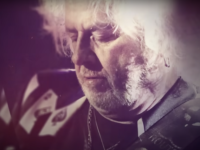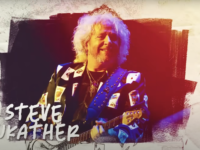Brutally described in a review of their eponymous 1978 debut by Rolling Stone as pros with no poetry, the effortlessly polished and sleekly listenable Toto has been dismissed from the first.
Imagine every critic’s surprise, then, when the group went from occasional radio presence to pop music supernova with 1982’s IV. (RS sniffed that this smash, too, was of little distinction or consequence.) In the meantime, of course, key Toto contributors like Steve Lukather and Jeff Porcaro were playing on countless recordings from the period, shaping the decade’s musical infrastructure. Maybe it shouldn’t have come as such a shock that these guys were really, really good.
Yet, it did then — and, in many ways Lukather says, it still does now. Scratch the surface of those misconceptions, though, and you’ll find something more than the snarky comments ever allowed. We did just that, ignoring Toto’s many familiar hits to find a few deep-cut favorites to prove the point.
Let’s start with a track from the album Rolling Stone panned …
“ANGELA” (TOTO, 1978): Steve Lukather, for all of his mind-melding acumen as a first-call guitar sideman, was always Toto’s secret weapon for lover-man ballads. From 1979’s “99” to 1983’s “I Won’t Hold You Back,” from 1986’s “I’ll Be Over You” to 1988’s “Anna,” his fingerprints are on some of the band’s most heart-rending slow cookers. Go further back, though, to his beginnings as a 20-something wunderkind in the band, and you’ll discover the embryonic flashpoints for both impulses — sometimes, as with this album’s closing “Angela,” all inside one track.
“Angela” (like “Georgie Porgy,” Lukather’s other lead vocal on Toto) has a finely crafted, episodic feel — only this time, composer David Paich conveys even more dramatically the whip-sawing, almost tornadic feel of true passion. Inside this series of musical head fakes — as Toto moves from sweetly conveyed ballad to a thumping, angry groove — they make a definitive argument for the very thing that made them outsiders in a DiY-age that fetishized inspiration over craftsmanship.
These guys could do it all. Yet, somehow in the doing of it, that became a liability. You have to wonder, listening to “Angela,” if Toto would have been thought of differently had they not arrived just as punk and new wave became a popular flash point in rock music.
[SOMETHING ELSE! REWIND: David Paich opens up about Toto bandmate Mike Porcaro’s battle with Lou Gehrig’s disease: “We’re trying to get out there and make people more aware of ALS.”]
“DON’T STOP ME NOW” (FAHRENHEIT, 1986): A collaboration with Miles Davis, co-written by Lukather and Paich, closed out this project — and it might have seemed like an odd-ball choice, if not for the guitarist’s history with one of jazz music’s most mercurial figures.
First, though, was the music: Davis’ lonesome mute curls in among Lukather’s crying notes like smoke ringlets, and then the trumpeter takes center stage — offering a twilight blues. Even as Toto once again rises to the challenge, constructing as urbane a music bed as anyone then working in contemporary improvised music, Davis solos with reserved fury and then, as with the aforementioned smoke, he’s gone. It brought Lukather full circle. After all, he had been offered a spot in Davis’ band just as Toto was preparing for one of its earliest tours. But Lukather, who had grown up with most of the members of Toto, simply couldn’t — wouldn’t — leave people he loved then, as now, like brothers.
“He asked me,” Lukather told us, “and I said I couldn’t. We were just getting started. I told him, ‘I don’t even know if I am good enough to be in your band.’ (Lukather begins to impersonate Davis, switching to a gravelly whisper.) He says ‘I like that rock ’n’ roll shit.’ I was so honored, but I couldn’t do that to my guys. There was something about us that kept us together — even though we were reviled by the critics. We just kept thinking people were going to get it. In some ways, that day has not come yet.”
“THE OTHER SIDE” (KINGDOM OF DESIRE, 1993): This became the final studio project to feature co-founding drummer Jeff Porcaro, who would pass away shortly after recording was completed. That has always given Kingdom of Desire this deep emotional resonance, perhaps nowhere more than on this song, which speaks to our dreams of reaching across time for a lost loved one.
“The Other Side,” co-written by Paich and Billy Sherwood, was part of an album that saw Lukather take over all of the lead vocals for the first time. This musical intersection wasn’t Sherwood’s first, as he’d received a key assist from Porcaro when Sherwood’s first band Lodgic happened to be rehearsing adjacent to Toto. Porcaro brought Paich and his brother Steve Porcaro over to hear Sherwood and Co., and they helped Sherwood get his first record deal in a career that would eventually include a stint in Yes.
“Years later, I was over at Paich’s one evening, and he played me a track from Kingdom of Desire and I started singing a few things, and that became the melody,” Sherwood told us. “I had never worked with them on that level before. He asked if I wanted to take a stab at it, and the rest is history. Luke came in and pretty much sang it note for note, which I found very respectful. I was honored to be a part of the last record with Jeff before we lost him. There will always be a very special place in my heart, having a song on that record.”
[SOMETHING ELSE! INTERVIEW: Toto’s Steve Lukather joined us to talk about his forthcoming, star-packed, very emotional solo album, saying: “I really dug deep.”]
“GOOD FOR YOU” (IV, 1982): It’s admittedly nearly impossible to find anything considered a true deep cut on this ubiquitous album. After all, IV eventually spawned three Top 10 singles (including Toto’s lone No. 1, “Africa”) and earned a whopping six Grammy Awards.
Still, “Good for You” deserves mention as one of the album’s drum-tight, lesser-known gems. It’s a terrific example of how Toto, at the height of its powers, mixed and matched so many popular styles. Co-written by Lukather and erstwhile frontman Bobby Kimball, the tune finds Kimball in all of his full-throated glory — matching the lyric’s unvarnished, carnal desire. He performed, then as now, with a reckless, edgy abandon — something that probably contributed to the reedy texture of his voice sometimes these days. The seemingly effortless musicians behind him did the rest.
In fact, “Good For You,” though originally relegated to a B-side on the “Africa” single, is one of the better illustrations of what made Toto so compulsively listenable in their hey day. It boasts a Cuisinart-y blend of genre feels and styles: There’s a soaring, almost proggy synth riff (it’s one part early Keith Emerson and one part Point of Know Return-era Kansas); an unforgettably ear-wormy chorus; a dream-sequence middle-eight; and, finally, a scorching solo from Lukather at the fade. And, through it all, they never let go of this relentless, R&B-infused groove.
“HYDRA” (HYDRA, 1979): A weirdly transfixing excursion, dark, edgy and more than 7 minutes in length, opens Toto’s second full length. So, sure, everybody skipped right to the ballad, “99.” But go back. I’d argue, and for a while, that this is some of the most interesting guitar work Lukather has done. Meanwhile, keyboardists Steve Porcaro and David Paich (who sings lead) once again encircle the proceedings with these prog-rock inspired flourishes. And the lyrics? Similarly wigged out.
“I listen to that album, and I think ‘how high were we?,'” Lukather told us. “You can hear the youth in it. But at the same time, we were trying to find our way. We were just experimenting, and we didn’t care what anybody thought. They already hated us!”
If there’s a knock, it’s that Toto didn’t take its hinted-at broader theme — the tale of St. George, but from perspective of the beast he’s aiming to off — across the length of Hydra. Instead, they changed gears, some said incessantly, in what appear to be obvious bids for radio play. I must say, though: I’m still interested in the prog-rock record Toto never completed.
- How Deep Cuts on ‘Music From Big Pink’ Underscore the Band’s Triumph - July 31, 2023
- How ‘Islands’ Signaled the Sad End of the Band’s Five-Man Edition - March 15, 2022
- The Band’s ‘Christmas Must Be Tonight’ Remains an Unjustly Overlooked Holiday Classic - December 25, 2016




